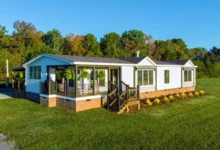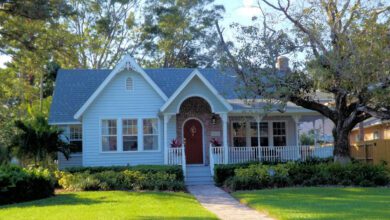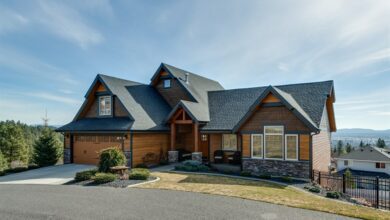Manufactured Home on Land for Sale: Choosing the Right Location
Manufactured Home on Land for Sale – Are you in the market for a manufactured home on land? Look no further! In this comprehensive guide, we will walk you through everything you need to know about buying a manufactured home on land for sale. From understanding the benefits of these homes to finding the perfect location, we’ve got you covered. So, let’s dive in and explore the world of manufactured homes on land!
As the demand for affordable housing continues to rise, more and more people are turning to manufactured homes on land as a viable solution. These homes offer a unique combination of affordability and flexibility, making them an attractive option for many homebuyers. Whether you’re a first-time buyer or looking to downsize, a manufactured home on land can provide you with the space and comfort you need.
Understanding Manufactured Homes
Manufactured homes, also known as mobile homes, are factory-built homes that are transported to a specific location and placed on a foundation. These homes are constructed in a controlled environment, ensuring high-quality craftsmanship and adherence to building codes. Unlike traditional homes, manufactured homes are built according to federal regulations set by the U.S. Department of Housing and Urban Development (HUD).
How do Manufactured Homes Differ from Traditional Homes?
One of the key differences between manufactured homes and traditional homes is the construction process. Manufactured homes are built in a factory, while traditional homes are typically built on-site. This factory construction allows for greater precision and efficiency, resulting in cost savings that are often passed on to the homebuyer.
Another difference is the materials used in construction. Manufactured homes often incorporate lighter materials that are specifically designed for transportation and installation. However, this does not mean that manufactured homes compromise on quality. In fact, modern manufactured homes are built to meet or exceed the same building codes as traditional homes.
The Advantages of Choosing a Manufactured Home
There are several advantages to choosing a manufactured home on land. One of the primary benefits is affordability. Manufactured homes are generally more affordable than traditional homes, making homeownership accessible to a wider range of individuals and families.
Another advantage is the flexibility and customization options that manufactured homes offer. Many manufacturers provide a variety of floor plans and finishes to choose from, allowing buyers to personalize their homes to suit their preferences and needs.
Manufactured homes are also known for their energy efficiency. These homes often come equipped with energy-efficient features such as insulation, windows, and appliances, which can help reduce utility costs and contribute to a more sustainable lifestyle.
Choosing the Right Location
Location is a crucial consideration when buying a manufactured home on land. The right location can enhance your quality of life and provide convenience and accessibility to amenities. Here are some factors to consider when choosing the perfect location for your manufactured home:
Zoning Regulations and Land Use
Before purchasing land for your manufactured home, it’s important to research and understand the local zoning regulations and land use restrictions. Zoning regulations dictate how land can be used and may have specific requirements for manufactured homes. Ensure that the land you are considering is zoned for residential use and permits manufactured homes.
Additionally, some areas may have restrictions on the size or appearance of manufactured homes. Familiarize yourself with these regulations to ensure that your home will comply with local requirements.
Proximity to Amenities
Consider the proximity of the land to amenities such as schools, hospitals, shopping centers, and recreational facilities. Having these amenities within a reasonable distance can greatly enhance your quality of life and make daily tasks more convenient.
Access to transportation is also an important factor to consider. Evaluate the availability of public transportation options and major roadways to ensure easy commuting and accessibility for you and your family.
Infrastructure and Utilities
When purchasing land for a manufactured home, it’s crucial to assess the availability of infrastructure and utilities. Ensure that the land has access to essential services such as water, electricity, sewage systems, and internet connectivity. The cost and feasibility of connecting utilities to the land should also be considered.
If the land is located in a rural area, you may need to research alternative solutions for utilities, such as drilling a well for water or installing a septic system.
Natural Environment and Surroundings
Consider the natural environment and surroundings of the land you are considering. Evaluate factors such as the climate, topography, and vegetation. Determine whether the land is prone to natural hazards such as flooding, wildfires, or earthquakes.
Additionally, assess the level of privacy and tranquility that the land offers. Consider the views and surroundings, as well as any potential noise or pollution sources nearby.
Resale Value and Market Trends
While it’s impossible to predict the future, it’s important to consider the resale value and market trends of the area where you plan to purchase land for your manufactured home. Research the local real estate market and evaluate the historical trends in property values. This can help you make an informed decision and potentially maximize your investment in the long run.
Consulting with a local real estate agent or appraiser can provide valuable insights into the current market conditions and potential future developments in the area.
Financing Options for Manufactured Homes
Financing a manufactured home on land may differ from traditional home financing. It’s important to explore the various financing options available to ensure that you secure the best loan terms. Here are some financing options to consider:
Chattel Loans
Chattel loans are a common financing option for manufactured homes. These loans are specifically designed for the purchase of movable property, such as manufactured homes that are not permanently affixed to the land. Chattel loans often have higher interest rates and shorter terms compared to traditional mortgages.
When considering a chattel loan, it’s important to carefully review the terms and conditions, including the interest rate, repayment period, and any additional fees. Working with a reputable lender who specializes in manufactured home financing can help you navigate the process.
Mortgages for Manufactured Homes on Land
If the manufactured home is permanently affixed to the land and meets certain requirements, you may be eligible for a mortgage similar to traditional home financing. These mortgages typically offer lower interest rates and longer repayment periods compared to chattel loans.
It’s important to note that not all lenders offer mortgages for manufactured homes. Research and connect with lenders who specialize in this type of financing to explore your options and find the best terms.
Government-backed Loans
Several government-backed loan programs, such as those offered by the Federal Housing Administration (FHA) and the Department of Veterans Affairs (VA), provide financing options for manufactured homes. These programs often have more flexible eligibility criteria and lower down payment requirements.
Consult with a mortgage specialist or a housing counselor to determine if you qualify for any government-backed loan programs and to understand the specific requirements and benefits associated with each program.
Navigating the Buying Process
Buying a manufactured home on land involves a unique set of steps. Here’s a step-by-step guide to help you navigate the buying process:
1. Determine Your Budget
Before you start searching for a manufactured home, it’s crucial to determine your budget. Consider factors such as your income, expenses, and existing debts. Establishing a realistic budget will help you narrow down your options and ensure you can comfortably afford the monthly mortgage or loan payments.
2. Research and Visit Dealers
Research and identify reputable manufactured home dealers in your desired area. Visit their websites and review their inventory to get an idea of the homes they offer. Consider factors such as the manufacturer’s reputation, the quality of their homes, and the range of customization options available.
Once you have shortlisted a few dealers, visit their showrooms or model homes to get a firsthand look at the homes they offer. Take note of the layout, finishes, and overall quality of construction.
3. Obtain Financing Pre-approval
Obtaining financing pre-approval before starting your search can provide you with a clear understanding of your budget and help streamline the buying process. Contact lenders who specialize in manufactured home financing and submit the necessary documentation to get pre-approved for a loan.
Having pre-approval in hand will also demonstrate to sellers that you are a serious buyer, potentially strengthening your negotiating position.
4. Choose the Right Home
Once you have identified a reputable dealer and obtained financing pre-approval, it’s time to choose the right home for your needs. Consider factors such as the size, layout, number of bedrooms and bathrooms, and any desired customization options.
Take into account your current and future needs. If you have a growing family or plan to use the home as a long-term residence, consider a home with additional space and flexibility.
5. Conduct Inspections and Due Diligence
Before finalizing your purchase, it’s important to conduct thorough inspections and due diligence. Hire a professional home inspector who specializes in manufactured homes to assess the condition of the home and identify any potential issues.
In addition to a general inspection, consider conducting specialized inspections for the foundation, plumbing
5. Conduct Inspections and Due Diligence (Continued)
In addition to a general inspection, consider conducting specialized inspections for the foundation, plumbing, electrical systems, and HVAC. This will ensure that everything is in proper working order and meets safety standards.
It’s also essential to review any relevant documents, such as the title, land lease agreement (if applicable), and any restrictions or covenants associated with the property. This will help you understand your rights and responsibilities as a homeowner.
6. Negotiate the Price and Terms
Once you have completed the inspections and due diligence, it’s time to negotiate the price and terms of the purchase. Consider factors such as the condition of the home, any necessary repairs or upgrades, and the current market conditions.
Work closely with your real estate agent or attorney to draft a purchase agreement that outlines the terms of the sale, including contingencies, financing arrangements, and any specific requests you may have.
7. Secure Financing
With the purchase agreement in place, it’s time to secure the financing for your manufactured home on land. Provide the necessary documentation to your lender and work closely with them to complete the loan application process.
Be prepared to provide additional information or documentation as requested by the lender. Stay in constant communication with your lender and respond promptly to any inquiries to ensure a smooth and timely closing process.
8. Close the Sale
The closing process involves the final transfer of ownership and the completion of all necessary paperwork. Coordinate with your real estate agent, attorney, and lender to ensure that all required documents are prepared and signed.
During the closing, you will typically sign the mortgage or loan documents, pay any closing costs or fees, and receive the keys to your new manufactured home on land. It’s important to review all documents carefully and ask any questions you may have before signing.
Congratulations! You are now the proud owner of a manufactured home on land.
Customizing Your Manufactured Home
One of the advantages of owning a manufactured home on land is the ability to customize it to your liking. Here are some ways you can personalize your manufactured home:
Choose Your Floor Plan
Manufactured home dealers often offer a variety of floor plans to choose from. Consider your lifestyle, preferences, and needs when selecting a floor plan. Think about the number of bedrooms and bathrooms, the layout of the living spaces, and any additional features or rooms you desire.
Some manufacturers also provide the option to customize the floor plan to better suit your preferences. This may involve rearranging rooms or adding specific features.
Select Finishes and Upgrades
From flooring and cabinetry to countertops and lighting fixtures, there are numerous finishes and upgrades you can choose to enhance the aesthetics and functionality of your manufactured home.
Consider your personal style and desired level of customization when selecting these finishes. Opt for durable materials that can withstand the test of time and require minimal maintenance.
Energy-Efficient Upgrades
If energy efficiency is a priority for you, consider incorporating energy-efficient upgrades into your manufactured home. This can include installing energy-efficient appliances, LED lighting, programmable thermostats, and energy-saving insulation.
These upgrades can help reduce your energy consumption, lower utility bills, and contribute to a more sustainable and environmentally friendly home.
Outdoor Living Spaces
Don’t forget about the outdoor areas of your manufactured home. Consider creating outdoor living spaces such as a patio, deck, or garden. These spaces can be beautifully landscaped and furnished to provide additional living and entertainment areas.
Add some outdoor furniture, potted plants, and decorative elements to create an inviting and relaxing outdoor oasis.
Maintenance and Upkeep
Like any home, manufactured homes on land require regular maintenance and upkeep to ensure their longevity and functionality. Here are some key maintenance tasks to keep in mind:
Regular Cleaning
Regularly clean your manufactured home both inside and out. This includes dusting, vacuuming, mopping, and wiping down surfaces. Pay special attention to areas such as the kitchen and bathroom, as these tend to accumulate dirt and grime more quickly.
Additionally, clean the exterior of your home to remove dirt, debris, and potential mold or mildew. This can be done with a pressure washer or by hand using appropriate cleaning solutions.
Inspect and Maintain the Roof
Regularly inspect your roof for any signs of damage, such as leaks or missing shingles. Repair any issues promptly to prevent further damage to the interior of your home. Consider scheduling a professional roof inspection every few years to ensure the integrity of your roof.
Keep gutters and downspouts clear of debris to allow proper drainage and prevent water damage.
HVAC Maintenance
Proper maintenance of your HVAC system is crucial to ensure its efficiency and longevity. Regularly clean or replace air filters according to the manufacturer’s instructions.
Consider scheduling annual HVAC inspections and servicing to identify any potential issues and ensure that your system is running smoothly.
Landscaping and Outdoor Maintenance
Maintain your outdoor spaces by regularly mowing the lawn, trimming bushes, and removing weeds. Keep walkways clear of debris and ensure that outdoor lighting is functioning properly.
If you have a garden, water and fertilize plants as needed and address any pest or disease issues promptly.
Insurance Considerations
Insurance is an essential aspect of homeownership. Here are some insurance considerations specific to manufactured homes on land:
Homeowner’s Insurance
Obtain homeowner’s insurance to protect your manufactured home and its contents from potential risks such as fire, theft, vandalism, and natural disasters. Shop around and compare insurance quotes to find the coverage that best suits your needs and budget.
Ensure that your insurance policy covers both the structure of your home and any personal belongings inside. Review the policy carefully to understand the coverage limits, deductibles, and any exclusions.
Flood Insurance
If your manufactured home is located in a flood-prone area, consider obtaining flood insurance. Standard homeowner’s insurance policies typically do not cover flood damage.
Contact the National Flood Insurance Program (NFIP) or private insurance companies that offer flood insurance to assess the flood risk in your area and obtain appropriate coverage.
Manufactured Home Warranty
Consider purchasing a manufactured home warranty to protect yourself against unexpected repairs or system failures. These warranties typically cover major systems and appliances in your home.
Before purchasing a warranty, carefully review the terms and conditions, coverage limits, and any exclusions. Compare different warranty providers to find the one that offers the best coverage and value for your specific needs.
Resale Value and Investment Potential
When purchasing a manufactured home on land, it’s natural to consider its resale value and investment potential. Several factors can impact the future value of your home:
Location and Market Trends
The location of your manufactured home can greatly influence its resale value. Research the local real estate market and consider factors such as the desirability of the area, the availability of amenities, and any future development plans.
Stay informed about market trends and fluctuations in property values. Consult with real estate professionals to gain insights into the potential appreciation or depreciation of your home.
Upgrades and Maintenance
Regular maintenance and upgrades can contribute to the resale value of your manufactured home. Keep your home in good condition and address any necessary repairs promptly to prevent further damage.
Consider making upgrades that align with current trends and buyer preferences. This can include energy-efficient features, modern finishes, or functional improvements.
Marketing and Presentation
When it comes time to sell your manufactured home, effective marketing and presentation can make a significant difference. Highlight the unique features and advantages of your home, both in your listing description and during showings.
Stage your home to create an inviting and appealing atmosphere. Clean and declutter the space, and consider adding some fresh paint or minor cosmetic updates to enhance its visual appeal.
Resources and Further Reading
For more information and resources on manufactured homes on land, consider exploring the following:
Manufactured Housing Institute (MHI)
The Manufactured Housing Institute is a national trade association that provides information, resources, and advocacy for the manufactured housing industry. Their website offers valuable insights into the industry, including market trends, financing options, and frequently asked questions.
HUD Manufactured Housing Program
The U.S. Department of Housing and Urban Development (HUD) oversees the federal manufactured housing program. Their website provides information on regulations, standards, and consumer resources related to manufactured homes.
Online Forums and Communities
Joining online forums and communities dedicated to manufactured homes can provide a wealth of information and opportunities to connect with other homeowners and industry professionals. Websites such as ManufacturedHomeLiving.com and MobileHome.net offer forums and resources for manufactured home enthusiasts.
Reading books and articles on manufactured homes
Resources and Further Reading (Continued)
Reading books and articles on manufactured homes can provide in-depth knowledge and insights into various aspects of homeownership. Look for titles such as “The Complete Guide to Manufactured Homes” by Sarah Edelman or “Mobile and Manufactured Home Living: The Ultimate Guide” by Crystal Adkins.
Additionally, consider reaching out to local manufactured home associations or attending industry events and trade shows. These can provide opportunities to network with experts and gain firsthand knowledge about the manufactured home market in your area.
Remember, knowledge is power when it comes to purchasing a manufactured home on land. By staying informed and utilizing the available resources, you can make confident and well-informed decisions throughout the buying process.
In conclusion, a manufactured home on land offers an affordable and flexible housing option for many individuals and families. By understanding the benefits, choosing the right location, securing appropriate financing, and properly maintaining your home, you can enjoy the comfort and convenience of homeownership. Take the time to research, ask questions, and consult with professionals to ensure a smooth and successful home-buying journey. Happy house hunting!









